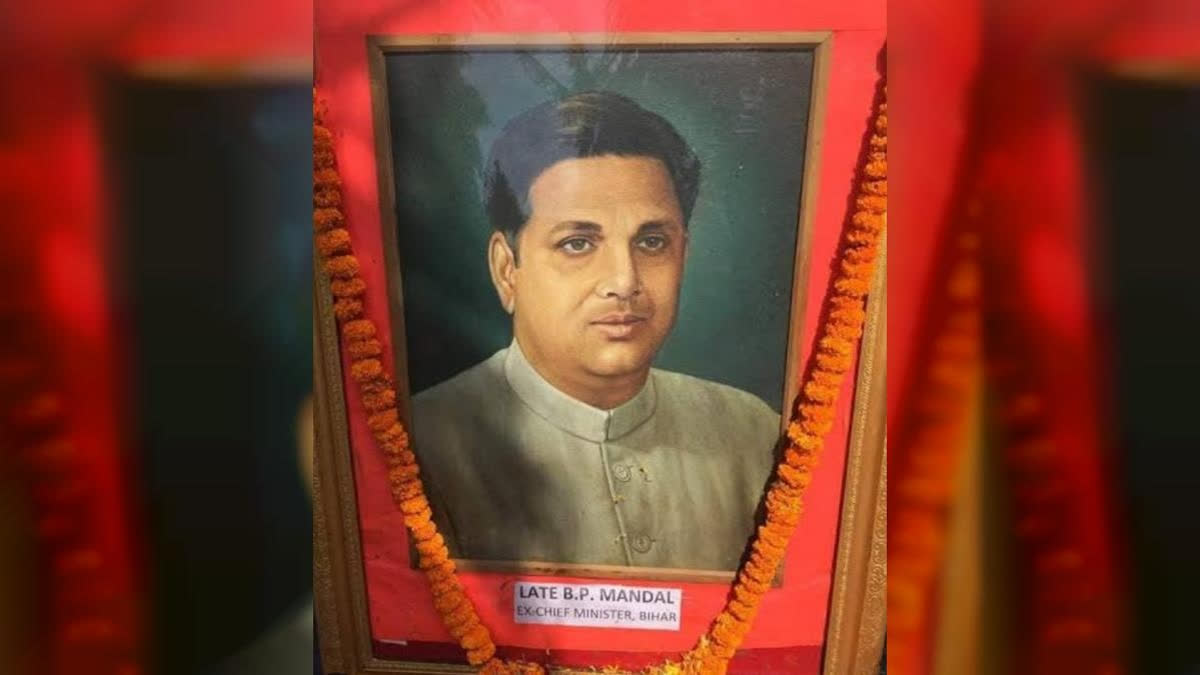Patna (Bihar): Former Bihar Chief Minister Bindeshwari Prasad Mandal was remembered across the nation on the occasion of his 106th birth anniversary. The Bihar government commemorated the day with a state function.
Functions were organised at his ancestral village in Madhepura, Bihar. Mandal was a leader, who proposed reservations for the backward classes through the Mandal Commission. He was born on 25 August 1918 in Varanasi, Uttar Pradesh. He received his primary education from Siris Institute in his ancestral village Murho.
बिहार के पूर्व मुख्यमंत्री, सामाजिक न्याय आंदोलन के महान विचारक, वंचितों उपेक्षितों को आरक्षण के माध्यम से मुख्यधारा में लाने के लिए मंडल कमीशन के द्वारा पुरजोर कोशिश करने वाले मंडल आयोग के अध्यक्ष स्व॰ बी.पी मंडल साहब की जयंती पर कोटि-कोटि प्रणाम, शत-शत नमन व विनम्र श्रद्धांजलि।… pic.twitter.com/nNfji89DTQ
— Tejashwi Yadav (@yadavtejashwi) August 25, 2024
He did his high school from Raj High School in Darbhanga. He was sent to Patna for higher education and he graduated in English Honors from Patna College. After completing his studies, he joined the State Administrative Service and worked as a magistrate from 1945 to 1951. However, due to differences with the then Bhagalpur District Magistrate, he resigned from the job.
स्व० बी०पी० मंडल जी की जयंती के अवसर पर आयोजित राजकीय समारोह में उनकी प्रतिमा पर माल्यार्पण कर उन्हें नमन किया। pic.twitter.com/EbZVDLKxQz
— Nitish Kumar (@NitishKumar) August 25, 2024
BP Mandal was elected as MLA in the first general election held in 1952. Bihar's first Chief Minister, Shri Krishna Singh, was very impressed by his powerful speech in the assembly. Although BP Mandal lost the election in 1957, he was elected again as MLA in 1962. In 1965, when he attempted to address the House about the police action in Pama village in Madhepura, he was not allowed to speak. This angered him, leading to his resignation from the Congress party.
After resigning from Congress, he joined the Samyukth Socialist Party. He worked hard for the party throughout Bihar and in the 1967 Bihar Assembly elections helping the United Socialist Party manage to win 69 seats. For the first time, a non-Congress government was formed in Bihar and BP Mandal was made the Health Minister. Meanwhile, due to internal conflicts in the party, BP Mandal left the party.
After leaving the Samyukth Socialist Party, BP Mandal formed his party. He established the Shoshit Dal on 1st February 1968 and became the Chief Minister of Bihar with the support of Congress. Although Shoshit Dal formed a government in Bihar, it was short-lived. BP Mandal's government fell within 45 days.
BP Mandal was a prominent figure for the backward class. His government came to an end shortly after he opposed the removal of the Iyer Commission, led by TL Venkataram Iyer. The Congress withdrew its support from his government due to this stance. In 1968, BP Mandal won a Lok Sabha by-election and became a Member of Parliament. He also won the Bihar Assembly election in 1972 and later became a Member of Parliament again in 1977, this time on a Janata Party ticket.
BP Mandal's grandson Nikhil Kumar Mandal told ETV Bharat that when his grandfather became the Chief Minister of Bihar, there was an oil leak in the Barauni refinery.
"The oil leaked and mixed with the Ganga river and a fire broke out. At that time the Bihar Legislative Assembly was in session and MLA Vinodanand Jha had said in the House that when a pure person becomes the Chief Minister, the Ganga will catch fire," recalled Nikhil Mandal.
"In response to Vinodanand Jha, BP Mandal had said that the fire in the Ganga had been caused by the oil leak. But everyone can feel the fire in their heart due to the son of a backward class becoming the Chief Minister. This statement was recorded in the Bihar Legislative Assembly and was widely discussed," added Nikhil Mandal.
On 1 January 1969, the then Prime Minister of the country, Morarji Desai, constituted the All India Backward Classes Commission under the chairmanship of BP Mandal. It was known as the Mandal Commission. However, after a few days, the government of Morarji Desai fell, and the Congress government was formed under the leadership of Indira Gandhi.
In December 1980, the Mandal Commission submitted its report to the then Home Minister Giani Zail Singh. In this report, more than three and a half thousand castes of backward classes of all religions were identified. The commission recommended giving them 27 per cent reservation in government jobs. In August 1990, then Prime Minister Vishwanath Pratap Singh made a historic announcement to implement a 27 per cent OBC quota in central government jobs.
Based on the Mandal Commission report, backward classes were granted 27 per cent reservation in central government jobs and admission to central educational institutions. However, a majority of the 40 recommendations provided by the commission have not been put into effect yet.
BP Mandal died on 13 April 1982 in Patna.



